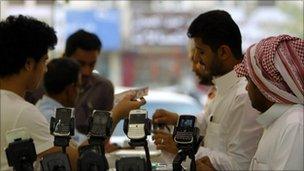Saudi Arabia begins Blackberry ban, users say
- Published

Blackberry's encrypted message service has some governments concerned
A ban on the use of Blackberry phones to send and receive messages is being rolled out in Saudi Arabia, users say.
State-owned phone operator Saudi Telecom has blocked text, e-mail, web surfing and instant messenger functions, users in the kingdom have told the BBC.
The country is one of a number concerned that such communications are encrypted and cannot be monitored.
They argue this hinders efforts to fight terrorism and criminal activity.
The United Arab Emirates has announced a similar ban starting in October.
Lebanon, India and Algeria have also raised concerns about the Canadian-made phones.
Services affected
No-one knew exactly when or how the ban would come into force, but Blackberry users in Saudi Arabia said the messaging suspension was being applied from about 1130 local time (0930 GMT), says the BBC's Ben Thompson from Dubai.
It was also briefly suspended on a rival network called Mobily, but residents say that service is back up and running, our correspondent says.
Blackberry handsets, made by Research in Motion (RIM), automatically encrypt messages and send them to computer servers in Canada.
Concerned governments have said they want access to these messages and the keys to decrypt them.
RIM has said the company's products were "designed to preclude RIM, or any third party, from reading encrypted information under any circumstances since RIM does not store or have access to the encrypted data".
"RIM cannot accommodate any request for a copy of a customer's encryption key, since at no time does RIM, or any wireless network operator or any third party, ever possess a copy of the key."
'No accountability'
Canada was concerned with "the broader implications of the potential interruptions of services that are being contemplated by these countries... in terms of the importance of the free flow of communications and information," Canadian Trade Minister Peter Van Loan said before the ban was enforced.
He said he was also concerned about the impact on business and trade.
"Canada has been working closely with the officials at Research In Motion as well as with governments on the ground to assist them in dealing with these challenges," he said.
And US officials have said they hope to broker a compromise between concerned governments and RIM.
"We are taking time to consult and analyse the full the range of interests and issues at stake, because we know that there is a legitimate security concern," Secretary of State Hillary Clinton said.
"But there is also a legitimate right of free use and access."
The United Arab Emirates Telecoms Regulatory Authority said in a statement to BBC News that Blackberry services were "currently the only data services operating in the UAE where data is immediately exported off-shore, where it is managed by a foreign, commercial organisation".
"In their current form, certain Blackberry services allow users to act without any legal accountability, causing judicial, social and national security concerns for the UAE."
The UAE has said it will block sending e-mails, accessing the internet, and delivering instant messages to other Blackberry handsets from 11 October.
- Published4 August 2010
- Published2 August 2010
- Published5 August 2010
- Published5 August 2010
- Published1 August 2010